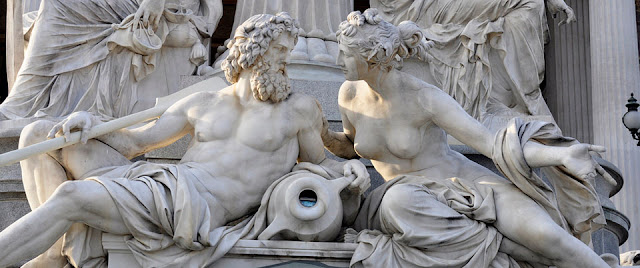ONLY Zeus, the Father of Heaven, might wield the thunderbolt; and it was with the threat of its fatal flash that he controlled his quarrelsome and rebellious family of Mount Olympus. He also ordered the heavenly bodies, made laws, enforced oaths, and pronounced oracles. When his mother Rhea, foreseeing what trouble his lust would cause, forbade him to marry, he angrily threatened to violate her. Though she at once turned into a serpent, this did not daunt Zeus, who became a male serpent and, twining about her in an indissoluble knot, made good his threat. It was then that he began his long series of adventures in love. He fathered the Seasons and the Three Fates on Themis; the Charites on Eurynome; the Three Muses on Mnemosyne, with whom he lay for nine nights; and, some say, Persephone, the Queen of the Underworld, whom his brother Hades forcibly married, on the nymph Styx. Thus he lacked no power either above or below earth; and his wife Hera was equal to him in one thing alone: that she could still bestow the gift of prophecy on any man or beast she pleased.
b. Zeus and Hera bickered constantly. Vexed by his infidelities, she often humiliated him by her scheming ways. Though he would confide his secrets to her, and sometimes accept her advice, he never fully trusted Hera, and she knew that if offended beyond a certain point he would flog or even hurl a thunderbolt at her. She therefore resorted to ruthless intrigue, as in the matter of Heracles's birth; and sometimes borrowed Aphrodite's girdle, to excite his passion and thus weaken his will.
c. A time came when Zeus's pride and petulance became so intolerable that Hera, Poseidon, Apollo, and all the other Olympians, except Hestia, surrounded him suddenly as he lay asleep on his couch and bound him with rawhide thongs, knotted into a hundred knots, so that be could not move. He threatened them with instant death, but they had placed his thunderbolt out of reach and laughed insultingly at him. While they were celebrating their victory, and jealously discussing who was to be his successor, Thetis the Nereid, foreseeing a civil war on Olympus, hurried in search of the hundred-handed Briareus, who swiftly untied the thongs, using every hand at once, and released his master. Because it was Hera who had led the conspiracy against him, Zeus hung her up from the sky with a golden bracelet about either wrist and an anvil fastened to either ankle. The other deifies were vexed beyond words, but dared attempt no rescue for all her piteous cries. In the end Zeus undertook to free her if they swore never more to rebel against him; and this each in turn grudgingly did. Zeus punished Poseidon and Apollo by sending them as bond-servants to King Laomedon, for whom they built the city of Troy; but he pardoned the others as having acted under duress.
1. The marital relations of Zeus and Hera reflect those of the barbarous Dorian Age, when women had been deprived of all their magical power, except that of prophecy, and come to be regarded as chattels. It is possible that the occasion on which the power of Zeus was saved only by Thetis and Briareus, after the other Olympians had conspired against him, was a palace revolution by vassal princes of the Hellenic High King, who nearly succeeded in dethroning him; and that help came from a company of loyal non-Hellenic household troops, recruited in Macedonia, Briareus's home, and from a detachment of Magnesians, Thetis's people. If so, the conspiracy will have been instigated by the High-priestess of Hera, whom the High King subsequently humiliated, as the myth describes.
2. Zeus's violation of the Earth-goddess Rhea implies that the Zeus-worshipping Hellenes took over all agricultural and funerary ceremonies. She had forbidden him to marry, in the sense that hitherto monogamy had been unknown; women took whatever lovers they pleased. His fatherhood of the Seasons, on Themis, means that the Hellenes also assumed control of the calendar: Themis ('order') was the Great Goddess who ordered the year of thirteen months, divided by the summer and winter solstices into two seasons. At Athens these seasons were personified as Thallo and Carpo (originally 'Carpho'), which mean respectively 'sprouting' and 'withering', and their temple contained an altar to the phallic Dionysus. They appear in a rock-carving at Hattusas, or Pteria, where they are twin aspects of the Lion-goddess Hepta, borne on the wings of a double-headed Sun-eagle.
3. Charis ('grace') had been the Goddess in the disarming aspect she presented when the High-priestess chose the sacred king as her lover. Homer mentions two Charites - Pasithea and Cale, which seems to be a forced separation of three words: Pasi thea cale, 'the Goddess who is beautiful to all men'. The two Charites, Auxo ('increase') and Hegemone ('mastery'), whom the Athenians honoured, corresponded with the two Seasons. Later, the Charites were worshipped as a triad, to match the Three Fates - the Triple-goddess in her most unbending mood. That they were Zeus's children, born to Eurynome the Creatrix, implies that the Hellenic overlord had power to dispose of all marriageable young women.
4. The Muses ('mountain goddesses'), originally a triad (Pausanias), are the Triple- goddess in her orgiastic aspect. Zeus's claim to be their father is a late one; Hesiod calls them daughters of Mother Earth and Air.


Comments
Post a Comment